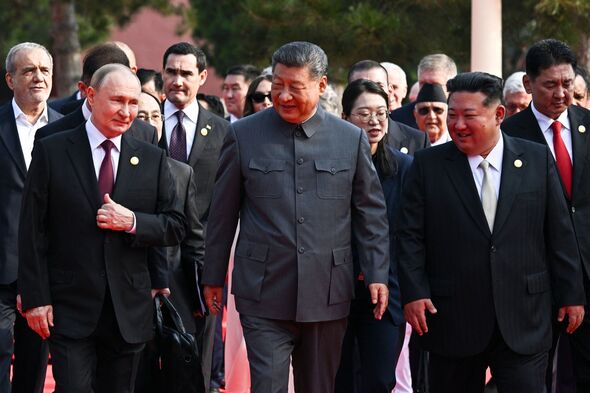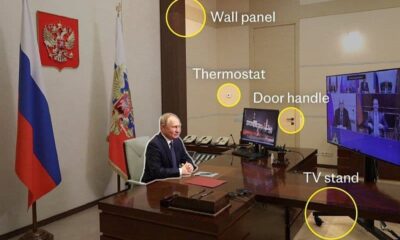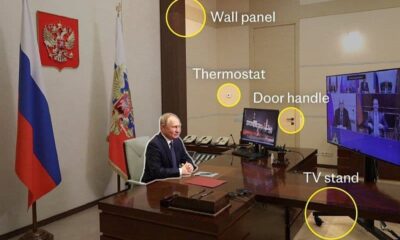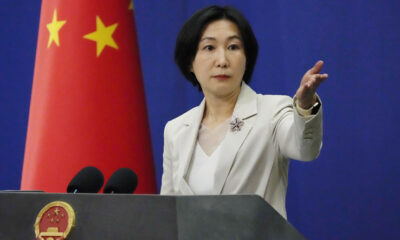Science
Scientist Debunks Putin and Xi Jinping’s Claims on Longevity

Leading scientists have dismissed claims made by Chinese President Xi Jinping and Russian President Vladimir Putin regarding the potential for humans to live to 150 years or even achieve immortality. These comments, made during a recent military parade in Beijing, have raised eyebrows in the scientific community, highlighting the divide between political rhetoric and established science.
During the parade, Xi Jinping remarked to Putin that while life expectancy was once limited to around 70 years, modern advancements might allow individuals to live significantly longer. In response, Putin asserted that with the advancement of biotechnology, organ transplants could enable people to live increasingly younger and potentially attain immortality. Xi further added that predictions suggest the possibility of living to 150 years within this century.
Despite the ambitious claims, James Markmann, the executive council president at the American Society of Transplant Surgeons, firmly rebutted these assertions, calling them “unfounded.” He stated, “There is currently no evidence suggesting that living to 150 years of age is possible through organ transplantation.” He emphasized that while there is significant interest in research related to aging, the notion that organ transplants could lead to such extended lifespans lacks scientific backing.
The discussion surrounding longevity is not new. Throughout history, figures from the wealthy elite to ancient leaders have sought methods to extend their lives. Notably, the ancient Egyptians utilized mummification, while Qin Shi Huang, China’s first emperor, famously constructed the Terracotta Army in part to accompany him into the afterlife.
In contemporary society, a growing trend among Silicon Valley tech leaders has emerged, with significant investments directed towards “biohacking” and cryonics in hopes of surpassing the century mark in lifespan. This modern pursuit echoes the age-old fascination with immortality, often viewed as the final frontier for those who have achieved considerable success and seek to push the boundaries of human existence.
Elizabeth Wishnick, an expert on Sino-Russian relations and senior research scientist at the Center for Naval Analyses, commented on the motivations behind such pursuits. She noted, “It’s logical for people who don’t feel limits to try to extend those boundaries.” This sentiment reflects a broader trend where those in positions of power and wealth seek to transcend the natural limits of life.
With significant investments from both Beijing and Moscow in anti-aging research and biotechnology, the dialogue surrounding life extension will likely continue to evolve. While political leaders may champion the prospect of extended human lifespans, the scientific community remains cautious, emphasizing the importance of grounded, evidence-based research over visionary aspirations. As these discussions unfold, the gap between hope and reality in the quest for immortality remains a topic of critical examination.
-

 Entertainment3 months ago
Entertainment3 months agoAnn Ming Reflects on ITV’s ‘I Fought the Law’ Drama
-

 Entertainment4 months ago
Entertainment4 months agoKate Garraway Sells £2 Million Home Amid Financial Struggles
-

 Health3 months ago
Health3 months agoKatie Price Faces New Health Concerns After Cancer Symptoms Resurface
-

 Entertainment3 months ago
Entertainment3 months agoCoronation Street’s Carl Webster Faces Trouble with New Affairs
-

 Entertainment3 months ago
Entertainment3 months agoWhere is Tinder Swindler Simon Leviev? Latest Updates Revealed
-

 World2 weeks ago
World2 weeks agoBailey Announces Heartbreaking Split from Rebecca After Reunion
-

 Entertainment4 months ago
Entertainment4 months agoMarkiplier Addresses AI Controversy During Livestream Response
-

 Entertainment2 weeks ago
Entertainment2 weeks agoCoronation Street Fans React as Todd Faces Heartbreaking Choice
-

 Science1 month ago
Science1 month agoBrian Cox Addresses Claims of Alien Probe in 3I/ATLAS Discovery
-

 Health4 months ago
Health4 months agoCarol Vorderman Reflects on Health Scare and Family Support
-

 Entertainment4 months ago
Entertainment4 months agoKim Cattrall Posts Cryptic Message After HBO’s Sequel Cancellation
-

 Entertainment3 months ago
Entertainment3 months agoOlivia Attwood Opens Up About Fallout with Former Best Friend





















